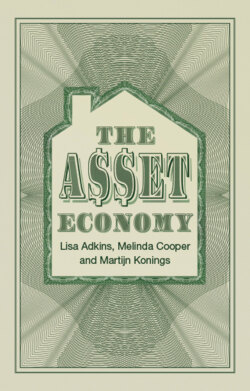The Asset Economy

Реклама. ООО «ЛитРес», ИНН: 7719571260.
Оглавление
Lisa Adkins. The Asset Economy
Contents
Guide
Pages
The Asset Economy. Property Ownership and the New Logic of Inequality
Copyright page
Preface
Introduction
Plan of the book
Asset Logics. From commodity logics to asset logics
Minskyan households
The centrality of housing
Governing the asset economy
The Making of the Asset Economy. Price inflation and asset deflation in the 1970s
Shifts in the tax and financial regime
Asset democratization and its contradictions
New Class Realities. Lineages of class theory
Class and generation
Asset-driven lifetimes
Conclusion
References
Index
POLITY END USER LICENSE AGREEMENT
Отрывок из книги
Lisa Adkins, Melinda Cooper and Martijn Konings
We are very grateful for the generous institutional support that this project has received from the Faculty of Arts and Social Sciences at the University of Sydney, in particular its FutureFix programme ‘Asset Ownership and the New Inequality’.
.....
The millennial generation is the first to experience this reality in its full force. So, the generational aspect is important not because it produces a uniform experience of social life or a clean divide between different generations (as a naïve approach to generational analysis would imply), but precisely because it is where the economic fault-lines that four decades of neoliberal fiscal and financial policies have produced are becoming visible. After all, some millennials have access to parental wealth (often itself the result of property inflation) that allows them to buy into dynamics of asset inflation. What we are seeing in the present era is the growing importance of intergenerational transfer and inheritance for the determination of life chances.
Crucially, however, this is not best understood as a return to an earlier era, when property was passed on (generally among men) from one generation to another in a more or less stable and mostly uneventful way. Inheritance is no longer a simple transmission of property titles, but increasingly a strategically timed transfer of funds that need to be leveraged and put to work in the speculative logic of the asset economy. This new logic of inequality has mixed ‘hypercapitalist’ logics of financialization with ‘feudal’ logics of inheritance to reshape the social class structure as a whole. The generational dimension interacts with the speculative logic of the contemporary financial system to shape asset-based lifetimes.
.....